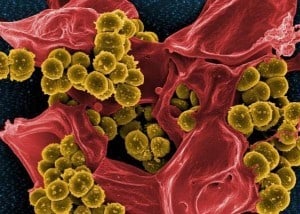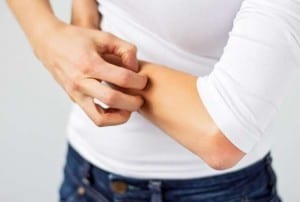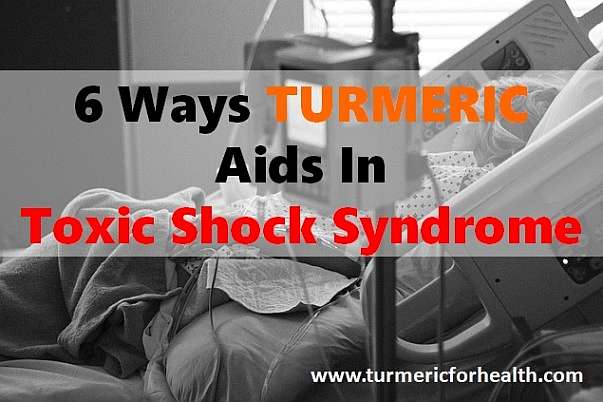Toxic shock syndrome is a rapid onset illness which can occur in otherwise healthy individuals.
It is caused by bacterial toxins.
The causative bacteria include Staphylococcus aureus and Streptococcus pyogenes. If caused by Streptococcus pyogenes, the condition is known as toxic shock-like syndrome.
Certain conditions are responsible for developing TSS:
- Using superabsorbent tampons, intrauterine devices, contraceptive barriers such that they remain in the body for a long time period
- Having open cuts and burns
- Recent surgical wounds
- Viral infection, GAS infection
The first risk factor formed was the reason why this condition was identified and then known as menstrual toxic shock syndrome.
Menstrual TSS is common in women who use superabsorbent tampons for long durations within a day; however, the link between menstrual TSS and tampons is debated upon.
Still, 50% of the TSS cases reported are not linked to menstruation and 25% of the non-menstrual TSS is cases are reported in men.
What happens in this disease is that the bacteria release some really nasty toxins which act as ‘superantigens’.
Antigens are foreign bodies or germs that are identified by the immune system and destroyed. Before being identified, these antigens need to be processed and then they activate a response from immune cells.
But superantigens, require no processing and hence they trigger quick and massive activation of T cells (immune cells) which alarms the system.
Normal antigens activate around 0.01% to 0.1% of existing T cell population, whereas superantigen activates around 5-30% of the T cell population. This leads to release of excessive amounts of inflammatory chemicals which damage tissue and organs.
TSS presents with the following symptoms:
- Sudden high fever
- Low blood pressure
- Rash and skin peeling off from palms and soles
- Diarrhea and vomiting
- Multiple organ system failures
- Confusion
- Headaches
CDC gives more clear criteria to identify TSS. Treatment involves removal of source of infection, antibiotic and symptomatic treatment.
Table of Contents
- How can Turmeric help in Toxic Shock Syndrome?
- 1. Turmeric inhibits the growth of TSS causative bacteria
- 2. Curcumin inhibits TSS induced inflammation
- 3. Antioxidant nature of curcumin normalizes blood pressure
- 4. Curcumin regulates the immune response in TSS
- 5. Turmeric can prevent multiple organ failure in TSS
- 6. Turmeric can soothe TSS induced skin rash
- Dosage
- Precautions
- Conclusion
How can Turmeric help in Toxic Shock Syndrome?
A couple of studies do show that turmeric and its pharmacological properties could be of help in toxic shock syndrome.
However, if it is a case of menstrual TSS, it is advisable not to take curcumin supplements as traditional medicine states that turmeric is a mild uterine stimulant.
1. Turmeric inhibits the growth of TSS causative bacteria

A number of research studies confirm turmeric’s anti-bacterial effect against S.aureus and its drug resistant strains.
Researchers at the University of Minnesota investigated the effect of curcumin on menstrual TSS.
Cell culture studies showed that treatment with curcumin reduced the inflammatory response caused by the toxin of S.aureus in vaginal mucosal lining cells.
Also in animal model curcumin reduced the lethality of toxin when applied intravaginally. Researchers concluded that application of curcumin topical formulation (not powder in cases of humans) intravaginally can help attenuate the toxicity of menstrual TSS.
What does this mean?
Turmeric exhibits anti-bacterial activity against S.aureus, the causative bacteria of TSS and research suggests that application of topical formulation of curcumin can prevent and ameliorate menstrual TSS.
2. Curcumin inhibits TSS induced inflammation
Increased activation of immune cells lead to what is called ‘cytokine storm’. It is an increased production of inflammatory chemicals which from a continuous feedback loop like reaction and cause damage.
Turmeric has a number of anti-inflammatory chemicals and curcumin is a very potent anti-inflammatory agent. Studies show that curcumin can tackle such sepsis induced cytokine storm by :
- Regulating NLRP3 inflammasome: a multiprotein unit that promotes the production of inflammatory chemicals
- Suppressing activity of nuclear factor-kappaB: a master protein that controls inflammation
- Inhibiting activity of inflammatory chemicals like Interleukin1, Interleukin6
- Activation of PPAR-gamma: anti-inflammatory protein
By virtue of its anti-inflammatory property curcumin can attenuate liver injury , fever and body ache occurring in TSS.
What does this mean?
Curcumin’s anti-inflammatory property can help bring down the excessive production of inflammatory chemicals which is responsible for the damage occurring in TSS. This can inturn prevent injury to organs and reduce associated fever and malaise.
3. Antioxidant nature of curcumin normalizes blood pressure
Oxidative stress is a common feature of most diseases and even occurs in septic shock. It is the imbalance between prooxidant and antioxidant agents in the body.
This oxidative stress can lead to low blood pressure, tissue and organ damage.
Curcuminoids (curcumin and related compounds naturally found in turmeric) are strong antioxidants whose antioxidant activity is comparable Vitamin E and C.
They reduce oxidative stress and raise the level of natural antioxidant enzymes to prevent oxidative damage.
In an animal study , an experimental model of toxic shock induced low blood pressure, curcumin administration influenced heart rate and restored blood pressure. It also improved renal function and activity of blood vessels.
Yilmaz et al have shown that by implementing its antioxidant and anti-inflammatory property, curcumin protects liver and kidney from sepsis induced damage.
What does this mean?
Turmeric and curcumin’s antioxidant activity can ameliorate hypotension (low blood pressure) and prevent liver and kidney damage occurring in TSS.
4. Curcumin regulates the immune response in TSS
Turmeric Milk has always been touted for its immune boosting property. Curcumin has immunomodulating properties- it can regulate immune responses.
Depending on the doses, curcumin can boost immunity or even suppress undesirable immune responses.
Curcumin analog regulates the activity of MD2 (myeloid differentiation protein) in a way that it suppresses activation of immune cells and production of inflammatory cytokines in sepsis or toxic shock like conditions.
T cells are perhaps the most important immune cells that , in case of dysfunction, can aggravate sepsis and immune related conditions.
Zhao et al have discussed the various by which curcumin can suppress the undesirable activity of T cells and this may make curcumin a feasible immunotherapeutic agent for treatment of sepsis and other T cell related conditions.
What does this means?
Curcumin influences immune responses and this could help suppress the undesirable activation of immune cells occurring in TSS.
5. Turmeric can prevent multiple organ failure in TSS
Toxic shock syndrome is confirmed when 3 or more systems of an individual start dysfunctioning in combination with other symptoms.
When the toxins elicit activate a large proportion of immune cells, inflammatory chemicals are produced in large amounts and apart from acting against the toxins, they cause damage to surrounding tissues and organs.
In such situations, TSS causes low blood pressure which affects brain functioning, loss of fluids due to diarrhea and vomiting affects kidney function and even respiratory distress could occur.
Liu et al have the studied the effect of curcumin in an experimental model of multiple organ dysfunction syndrome in animals.
It was observed that curcumin inhibited the activation of Nuclear factor-kappaB , the main biological element that controls inflammation.
It significantly reduced tissue damage by lowering oxidative stress, reducing effect and production of inflammatory chemicals and prevented migration of inflammatory and immune cells.
Other researchers also confirm these findings and state that curcumin prevent multiple organ injury by preventing immune cells and inflammatory chemicals from damaging tissues and organs.
For example, Yang et al that curcumin can protect the heart from inflammation induced by sepsis.
Turmeric and curcumin also possess the following properties which can ameliorate damage to various body systems :
- Gastroprotective (protects digestive system)
- Renoprotective (protects kidneys and urinary tract)
- Cardioprotective (protects heart)
- Neuroprotective (protects brain and nervous system)
- Protection from lung diseases
What does this mean?
Curcumin is proven to be effective in attenuating inflammation induced multiple organ dysfunction under experimental conditions. It also has a number of biological properties which can protect the body system from damage.
6. Turmeric can soothe TSS induced skin rash
Individuals suffering from TSS develop a sunburn like skin rash all over the body and later the skin starts peeling off or desquamates.

- Reduction of inflammation
- Preventing autoimmune reactions
- Wound healing property
- Skin regeneration potential
Ryan et al have shown that curcumin can reduce radiation induced skin damage and desquamation in breast cancer.
These findings in combination with other therapeutic properties suggest that turmeric can reduce TSS induced skin rash. (Read Turmeric for eczema and itching)
What does this mean?
Turmeric’s beneficial role in skin diseases could possibly help in TSS induced skin rash.
Dosage
There have been no clinical trials examining the effect of turmeric in TSS which could suggest a dosage. Also in case of menstrual TSS it is advisable to avoid turmeric supplements as turmeric is said to be a mild uterine stimulant.
Including turmeric in the diet is absolutely safe.
Around 1 teaspoon of turmeric powder with a pinch of black pepper and/or fats taken daily can be therapeutic.
You can make use of The Golden Paste or Turmeric Milk.
If you need help with identifying organic turmeric powder or good supplements check this link.
For more details on dosage, click here.
Precautions
Turmeric in the diet is safe, considering that you wouldn’t be adding more than 1-2 teaspoon turmeric powder in a family meal. Turmeric supplements on the other hand should be avoided in certain conditions:
- Pregnancy and lactation
- If suffering from gall stones
- If taking diabetes medication
- 2 weeks prior to surgery
- If suffering from a bleeding disorder
Turmeric supplements could have drug interactions with blood glucose lowering medications, blood thinning medicines and stomach acid lowering medicines. Take turmeric supplements only after consulting a health practitioner.
Conclusion
There are many ways by which turmeric could benefit in Toxic shock syndrome.
It is primarily due to its anti-microbial activity against S.aureus and anti-inflammatory property. It could possibly boost the activity of regular treatment and help in faster control of the progression of the disease.
I would recommend taking The Golden Paste for TSS may be 1-2 times a day. In the case of turmeric supplements, it is best if you seek doctor’s advice.


Good information..!! But what is the effect of Turmeric on Hypertension..??
Turmeric does work as anti-hypertensive. http://www.nature.com/articles/srep25579
http://www.ncbi.nlm.nih.gov/pubmed/25477660
You can take Golden Paste. Start with 1/2 teaspoon and increase gradually to 1-2 teaspoons 2-3 times a day or how it suits you.
https://www.turmericforhealth.com/turmeric-recipes/how-to-make-turmeric-paste-or-golden-paste
i put 1 teaspoon ground tumeric and a pinch of black pepper into glass of low sodium V8 (which is supposedly good for hyperaldosteronism due to extra potassium and low sodium). Anyone else?
Every day
Thanks for this valuable information.